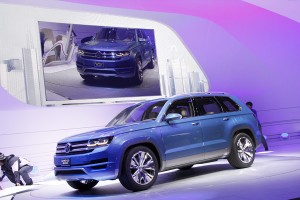
VW needs a home for the Cross Blue Concept and Tennessee has been considered the most likely production source.
A decision on whether to build a new midsized crossover vehicle at the Volkswagen plant in Chattanooga, Tennessee may not come until early next year now.
Various company sources caution that the German maker is looking at a variety of options for a production version of the Cross Blue concept, as well as for its plants in both Tennessee and in Mexico. But bringing Cross Blue to the U.S. is considered a leading alternative as it would both increase utilization of the sprawling factory complex and give ready access to what is likely to be the crossover’s largest market.
Frank Fischer, president and chief executive officer of the Volkswagen manufacturing facility in Chattanooga says he is hoping a decision on the long-delayed plans for Cross Blue will be made soon. But it likely won’t come until late this year or even the first quarter of 2014, he said.
Volkswagen is now fine-tuning the business case for the vehicle, which requires rigorous cost analysis as well as cooperation from marketing, engineering and purchasing.
Jonathan Browning, CEO of Volkswagen’s American division, has said a midsize crossover which would fill the space between the small Tiguan SUV and the pricey, five-seat Touareg, is clearly needed in the company’s U.S. lineup. It would help parent Volkswagen AG’s meet its goal of more than doubling U.S. sales to 1 million by 2018.
Meanwhile, Fischer said the Chattanooga plant is steadily working at improving its systems. While a decision in May to reduce the number of contractors at the plant was interpreted as a sign the plant was facing difficulties, productivity has been improving, which reduces the number of employees required to build vehicles, Fischer said.
The plant and the Americanized version of the Volkswagen Passat it builds have won several awards, he noted . “I tell my team this has been a great success,” Fischer asserted.
Meanwhile, the plant also continues to prepare for the future. It recently recruited 24 students for the next class in its three-year apprenticeship program. The 24 candidates for the apprenticeship program were selected from dozens of candidates after rigorous testing.
The first class in the apprenticeship program officially graduated this week amid pomp and circumstance that underscored the importance VW puts in using apprentices, an approach based on a highly regarded German model for teaching young workers technical skills.
“For our team to build top quality cars, our electrical and mechanical systems must function perfectly,” Fischer said during the ceremony attended by the friends and families of the dozen graduates as well as local politicians, including Tennessee governor Bill Haslam. “These students are now trained with a passion for detail that is crucial to our success and we are eager for them to join our skilled team of experts,” Fischer said.
The new graduates, all of whom were placed at jobs within the Volkswagen system, were recruited into the program even before the Chattanooga plant was opened for production in 2011.
“By becoming the first program in the U.S. to be fully accredited by the Association of German Chambers of Commerce and Industry together with the German American Chambers of Commerce (AHK USA), Volkswagen’s Automation Mechatronics Program is at the forefront of establishing quality standards for vocational training which will have a positive impact on local economies and communities,” according to Martina Stellmaszek of the German American Chambers of Commerce in Atlanta.
